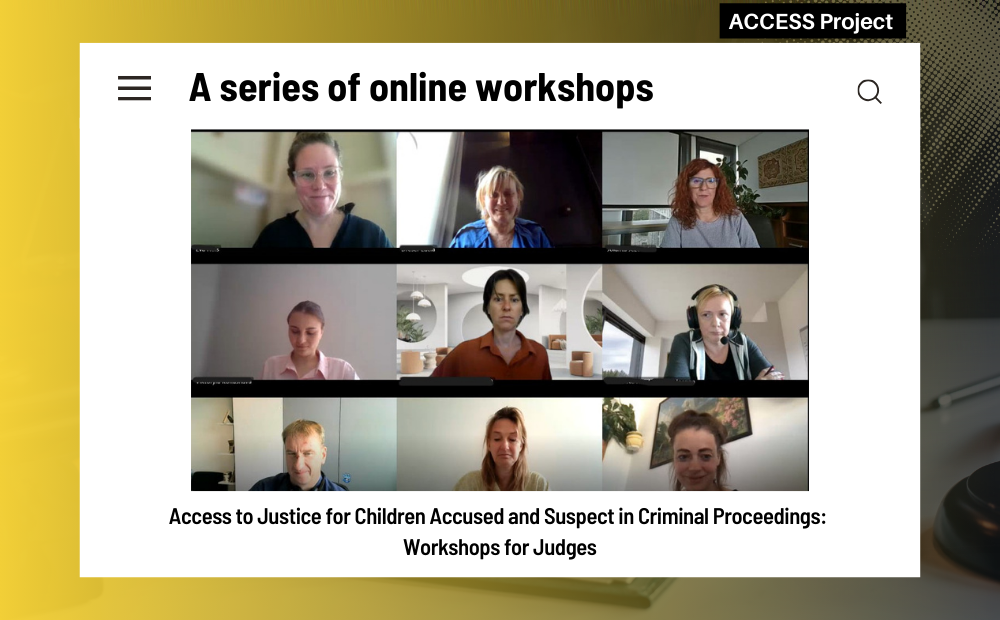In May 2024, the International Commission of Jurists (ICJ) hosted two online workshops bringing together judges from six EU countries to explore how justice systems respond to children suspected or accused in criminal proceedings.
Judges widely agreed that detention should remain a measure of last resort. Belgium’s model was highlighted as good practice, where diversion and restorative justice are not only prioritized but mandated by law. At the same time, concerns were raised that, in several countries, alternatives such as compulsory treatment or institutional placement can offer even fewer safeguards than detention. One of the problems noted was uncertainty around the length of such measures. For instance, in the Czech Republic, the duration of institutional placements is often unclear, while in the Netherlands, treatment orders can be extended indefinitely, causing ongoing insecurity for affected children.
“There is a lack of consistent and meaningful individual assessments,” said Viktoryia Konashava, Legal Researcher at the ICJ. “In jurisdictions like Poland, no formalized process exists to evaluate a child’s background or needs, leaving assessments entirely at the discretion of individual judges. In contrast, Belgium and the Netherlands involve multidisciplinary teams, including social workers, psychologists, and educators, more systematically. Nevertheless, resource gaps persist and stronger legal frameworks are needed,” she added.
The second workshop focused on post-verdict practices. Belgium was again commended for its protection-oriented approach, where sentences undergo mandatory review every six months and can only be modified to less restrictive measures. In contrast, other systems often lack consistent follow-up, delegate it to a different judge, or require children themselves to initiate the review process, if such an option exists at all. Judges emphasized:
“It is crucial for judges to have an active role in reviewing sentences and retain flexibility to reduce their severity to better protect children’s rights.”
Judges further compared practices regarding criminal records, noting broad support for deleting records automatically or after a set period, especially for diversion measures.
Judicial training was highlighted as another critical shortcoming. In most countries, there is no mandatory requirement for judges to undergo specialized training on child psychology, communication skills, or methods for engaging with children with disabilities. Where such training is available, it is often optional, inadequately funded, and dependent on individual initiative. This lack of structured preparation undermines the ability of judges to respond effectively and sensitively in youth cases.
Common themes identified during the workshop included the urgent need for structured individual assessments, enhanced judicial training, particularly regarding child development and disability, and improved post-verdict support systems. Participants agreed investments in alternatives to detention and mechanisms to reduce the long-term consequences of criminal records are essential to achieving justice systems that are more child-friendly, rights-based, and rehabilitative. Through this cross-border dialogue, judges not only gained a clearer picture of shared challenges, but identified potential solutions already effective in other jurisdictions.
Background
On 22 April 2025, the ICJ launched a series of online workshops for lawyers, judges, prosecutors and law enforcement personnel, social workers and probation officers, on access to justice for children suspected or accused in criminal proceedings. These workshops were organized within the framework of the ACCESS project and as a follow-up on the Transnational Exchange Roundtable held in March 2025 in Brussels. The aim was to explore specific issues in greater depth and strengthen legal assistance for children in conflict with the law.
The ACCESS project aims to foster EU-wide effective and non-discriminatory access to justice for children in criminal proceedings, and respect for children’s procedural rights amongst legal and other professionals. The project is implemented by the ICJ in partnership with NJCM – the Dutch section of the International Commission of Jurists, Forum for Human Rights in Czechia and Slovakia, Helsinki Foundation for Human Rights in Poland, Bulgarian Helsinki Committee, Defence for Children International – Belgium, with the support of ENNHRI – the European Network of National Human Rights Institutes.
Contacts
Karolína Babická, ICJ Senior Legal Advisor, karolina.babicka@icj.org
Viktoryia Konashava, ICJ Legal Researcher, viktoryia.konashava@icj.org





